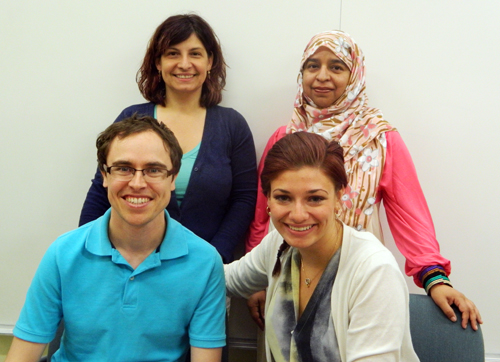
Do you have an old cellphone tossed in a drawer or an ancient computer in the back of your closet? Many people have electronic items they no longer use or need, but they aren’t quite certain how to properly dispose of them.
Mathematics professor Monica Cojocaru says the problem of electronic waste is growing rapidly around the world and she’s taking some small steps to tackle it here in Guelph.
Raising awareness of the issue is the first step. Cojocaru and her volunteers will have a table at the Canada Day celebrations at Riverside Park July 1, along with a bin to accept unwanted electronics. They’ll follow up with a one-day workshop Aug. 17 in Rozanski Hall, Room 103, featuring two guest speakers from the electronic waste disposal industry.
“This started when I was awarded a visiting research chair from the Fulbright Foundation in 2010,” says Cojocaru. “After that, I automatically became one of the Fulbright alumni and so I was notified about a new program in eco-leadership that provided funding for programs to benefit the environment. I thought it would be valuable to raise awareness among Canadian consumers about the issue of electronic waste.”
The Ontario government charges a tax to cover electronic waste disposal every time someone purchases a cellphone, computer or other electronic device. Ideally the discarded items will be recycled. Computers and cellphones contain rare metals and other components that can be reused, Cojocaru explains. Recycling saves money and benefits the environment.
Spreading the word on a little-known issue has, in at least one case, proven unexpectedly difficult. Cojocaru and her volunteers applied to participate at the annual Hillside Festival in late July, but were turned down. “The young people who attend Hillside would be our ideal target audience,” she says. “We were quite disappointed not to be able to participate.”
On July 1, they will have flyers and information to share with people attending the Canada Day event at Riverside Park and will invite them to attend the workshop in August. Volunteers Katherine Hertler, Steve Tully and Safia Athar will be participating in both events and are working to get the message out in other ways as well. Check the group’s Facebook page for updates and additional information. At both the Canada Day event and the August workshop, bins will be provided for people to deposit their no-longer-needed electronic devices.
Athar says she became involved because she was concerned that many developing countries are becoming dumping grounds for first-world electronic waste. “Many of these items emit radiation and are potentially hazardous to people,” she points out.
Cojocaru says the link to her research may not seem obvious at first, but in fact the issue of electronic waste management fits into her work on mathematical models of the effects of policies. While many people are unaware of the impact of electronic waste and the fees we pay to have them safely disposed of, or even the importance of recycling, she hopes greater awareness will be the first step to making changes.